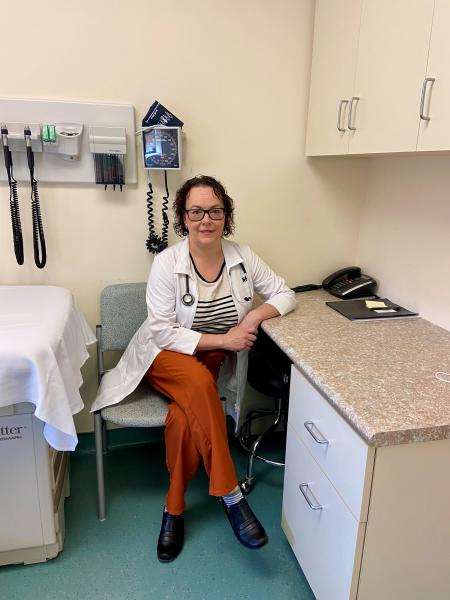A Yarmouth Nurse Practitioner providing hematology oncology care is a game changer for patients in Nova Scotia’s Tri-County area

Terrilee O’Connell is a nurse practitioner providing care for patients with hematologic cancers in the tri-county area of Yarmouth, Digby, and Shelburne. Before this position was created, patients with blood cancers like lymphoma, leukemia, or multiple myelomas, had to travel to Halifax to see a hematologist.
O’Connell sees patients at the Cancer Care Clinic at Yarmouth Regional Hospital, the first of its kind in Nova Scotia, where there is a community nurse practitioner in hematology without there also being a hematologist on-site.
While patients could always receive chemotherapy in Yarmouth, O’Connell supports patients with pre-chemo visits, regular monitoring for infusion reactions, prescribing systemic therapy, like chemotherapy, and most recently doing bone marrow biopsies.
Since January of 2023, O’Connell has seen well over one hundred patients who have been referred by hematologists in Halifax.
Clinic patient Wendy Robichaud says the nurse practitioner clinic is an invaluable resource, reducing the financial and physical burden of having to travel to Halifax for treatment.
“Every situation is different. I don't see all the patients from the area, but ones that are referred specifically, we share their care,” explains O’Connell. “Sometimes the patient is seen here in Yarmouth one month, and another time they travel to the hematologist in Halifax. It's very dependent on the patient, their disease state, and what treatment they're on.”
Combined with many appointments being conducted over the phone following the COVID-19 pandemic, the burden of travel for hematology oncology patients in the tri-county has been significantly reduced. O’Connell said the travel to a Halifax appointment makes for an exceptionally long day.
“If you're just going to Halifax for bone marrow and you have to travel 4 hours there, then 4 hours back for a 15-minute appointment, it's very tiring for people. They don't feel well to begin with, and now they're needing to travel. There's the expense of needing to find a place to stay unless they do the drive both ways in one day, and parking is atrocious. If you ask patients, they say one of the things they hate most is trying to find parking.”
She said the feedback she’s been hearing is overwhelmingly positive. The patient population is growing and we’re getting busier in the clinic.
“It’s made a tremendous difference for me” said Wendy Robichaud who no longer has to travel to Halifax for follow-up appointments. “Your care should be the same whether you live in Halifax, Yarmouth, or Cape Breton. This clinic has levelled that playing field.”
“It's going really well” said O’Connell, adding the hematologists have been very welcoming, open, and helpful, and I've done a lot of work with them in training.” In addition to O’Connell, a drug access navigator, full time pharmacist and social worker have been added to the team.
O’Connell created a pilot Cancer Related Fatigue Group to address a gap in support for patients with blood cancers. She said the prognosis for some blood cancers is vastly different than for malignant tumors because many of these people are not going to get better.
“These people have to live with it, and the fatigue, for the rest of their lives. A lot of the information out there for patients says while you're on chemo and while you're in active treatment, you're going to be really tired, but it's going to get better. I realized that that didn't apply to the people with blood cancers, because a lot of times it doesn't get better.”
“Nova Scotia Health has a lot of videos online to help people deal with cancer related fatigue, but all the information says the fatigue is time limited, and it isn’t for the patients I see. It just doesn’t get better for these folks.”
“I feel so supported” says Robichaud. “Having Terrilee here gave me access to a support group that I otherwise would not have benefitted from. It doesn’t change anyone’s fatigue level, but the tips and knowledge, and support from sitting down with a group of people who are experiencing similar things, improves my quality of life.”
The pilot group, supported by a dedicated onsite social worker, focused on stress management, energy reserve, sleep, diet and exercise. O’Connell hopes another support group will begin shortly, based on the success of the pilot.
Robichaud says her quality of care she receives from the clinic, O’Connell, and the support group, is phenomenal. “Not only am I getting quality care, I’m getting quality care close to home.”
Photo of nurse practitioner, Terrilee O’Connell.